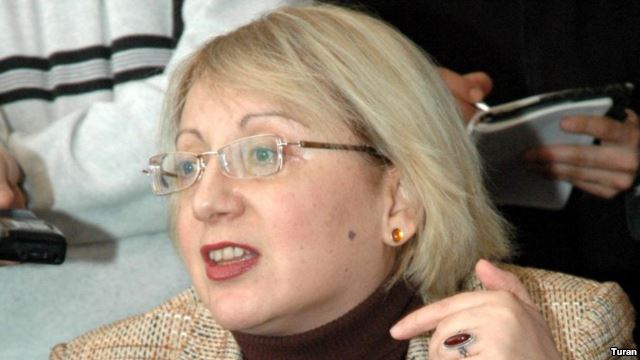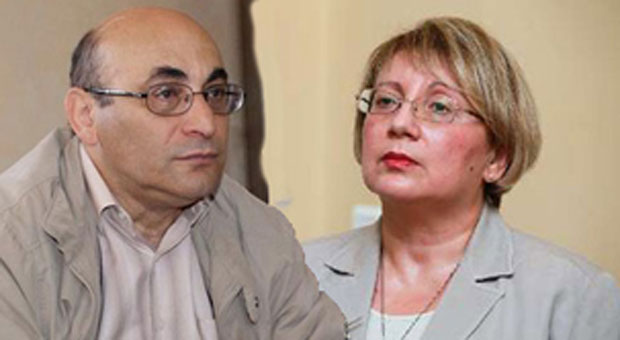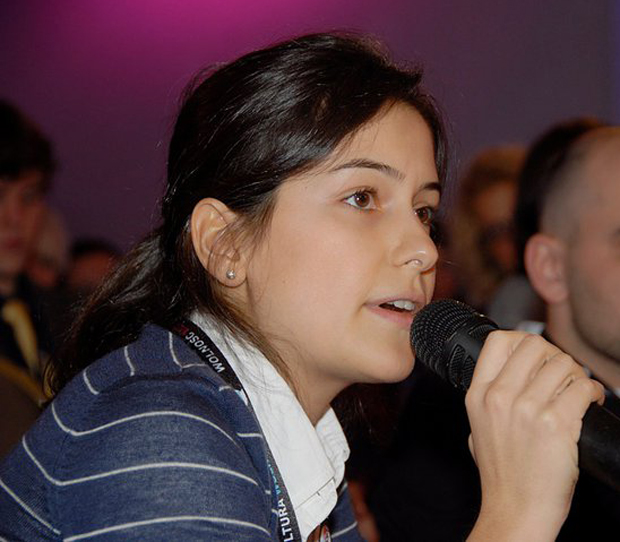6 Nov 2014 | Azerbaijan, Azerbaijan News, Europe and Central Asia, News and features

Two lawyers representing Azerbaijani human rights activist Leyla Yunus’s have been dismissed from her case. Javad Javaldi announced his suspension on 29 October, followed by Khalid Bagirov on 5 November. This comes as Azerbaijan’s ambassador to the United Kingdom says the government is “deeply committed” to strengthening its cooperation with the country’s civil society.
The prosecutor general’s office has not provided explanations for the suspensions. They have also prevented Bagirov from meeting with his client Rasul Jafarov, another prominent Azerbaijani human rights activist currently imprisoned.
The lawyers’ dismissal comes less than two weeks after Yunus said she had been denied access to her lawyers. In late September, her lawyers expressed concern at being unable to meet with Yunus in person or speak on the phone with her, saying they were concerned about her physical wellbeing. She has reportedly been beaten by both guards and her cellmate and denied medical attention.
The court has also reportedly extended Yunus’s detention until 28 February. She was initially arrested on July 30 with her husband, Arif, who recently had his pretrial detention extended until 5 March. The two are charged with high treason, spying for Armenia, illegal business activities, document forgery and fraud.
Both detention extensions go against calls from the European Parliament to Azerbaijan to release political prisoners and reform human rights. Last month the European Union praised President Ilham Aliyev when he announced he would release 80 prisoners, including some human rights activists.
Thorbjørn Jagland, secretary general of the Council of Europe and chair of the Norwegian Nobel Committee, wrote on Monday that Azerbaijan has been “repeatedly warned…over its poor human rights record”.
In a response to Jagland, Ambassador Tahir Taghizadeh wrote in a letter in The Guardian on Thursday that his country has “come a long way in strengthening democracy and human rights over the last 23 years.” He added that “there still exists a long way to go,” and the government looks forward to working with civil society to resolve “human rights issues”.
This article was originally posted on 6 November at indexoncensorship.org
2 Nov 2014 | Campaigns, Russia, Statements
Aleksandr Bastrykin
Head of the Investigative Committee of Russian Federation
The Investigative Committee of Russian Federation
105005, Russia, Moscow, Technicheskii Lane, 2
Sunday 2 November 2014
Dear Mr Bastrykin,
RE: Request for investigation into the murder of Akhmednabi Akhmednabiyev to be transferred to the Central Investigative Department of the Russian Federation’s Investigative Committee.
On the International Day to End Impunity for Crimes against Journalists (2 November) we, the undersigned organisations, are calling upon you, in your position as Head of the Investigative Committee of the Russian Federation, to help end the cycle of impunity for attacks on those who exercise their right to free expression in Russia.
We are deeply concerned regarding the failure of the Russian authorities to protect journalists in violation of international human rights standards and Russian law. We are highlighting the case of Ahkmednabi Akhmednabiyev, a Russian independent journalist who was shot dead in July 2013 as he left for work in Makhachkala, Dagestan. In his work as deputy editor of independent newspaper Novoye Delo, and a reporter for online news portal Caucasian Knot, Akhmednabiyev, 51, had actively reported on human rights violations against Muslims by the police and Russian army.
His death came six months after a previous assassination attempt carried out in a similar manner in January 2013. That attempt was wrongly logged by the police as property damage, and was only reclassified after the journalist’s death. This shows a shameful failure to investigate the motive behind the attack and prevent further attacks, despite a request from Akhmednabiyev for protection. The journalist had faced previous threats, including in 2009, when his name was on a hit-list circulating in Makhachkala, which also featured Khadjimurad Kamalov, who was gunned down in December 2011. The government’s failure to address these threats is a breach of the State’s “positive obligation” to protect an individual’s freedom of expression against attacks, as defined by European Court of Human Rights case law (Dink v. Turkey).
A year after Akhmednabiyev’s killing, with neither the perpetrators nor instigators identified, the investigation was suspended in July 2014. As well as ensuring impunity for his murder, such action sets a terrible precedent for future investigations into attacks on journalists in Russia. ARTICLE 19 joined the campaign to have his case reopened, and made a call for the Russian authorities to act during the United Nations Human Rights Council (HRC) session in September 2014. During the session, HRC members, including Russia, adopted a resolution on safety of journalists and ending impunity. States are now required to take a number of measures aimed at ending impunity for violence against journalists, including “ensuring impartial, speedy, thorough, independent and effective investigations, which seek to bring to justice the masterminds behind attacks”.
While the Dagestani branch of the Investigative Committee has now reopened the case, as of September 2014, more needs to be done in order to ensure impartial, independent and effective investigation. We are therefore calling on you to raise Akhmednabiyev’s case to the Office for the investigation of particularly important cases involving crimes against persons and public safety, under the Central Investigative Department of the Russian Federation’s Investigative Committee.
Sadly, Akhmednabiyev’s case is only one of many where impunity for murder remains. The investigations into the murders of journalists Khadjimurad Kamalov (2011), Natalia Estemirova (2009) and Mikhail Beketov (who died in 2013, from injuries sustained in a violent attack in 2008), amongst others have stalled. The failure to bring both the perpetrators and instigators of these attacks to justice is contributing to a climate of impunity in the country, and poses a serious threat to freedom of expression.
Cases of violence against journalists must be investigated in an independent, speedy and effective manner and those at risk provided with immediate protection.
Yours Sincerely,
ARTICLE 19
Amnesty International
Albanian Media Institute
Association of Independent Electronic Media (Serbia)
Azerbaijan Human Rights Centre
Center for Civil Liberties (Ukraine)
Center for National and International Studies (Azerbaijan)
Civic Assistance Committee (Russia)
Civil Society and Freedom of Speech Initiative Center for the Caucasus
Committee to Protect Journalists
Glasnost Defence Foundation (Russia)
Helsinki Citizens’ Assembly – Vanadzor (Armenia)
Helsinki Committee of Armenia
Human Rights House Foundation
Human Rights Monitoring Institute (Lithuania)
Human Rights Movement “Bir Duino-Kyrgyzstan”
Memorial (Russia)
Moscow Helsinki Group
Norwegian Helsinki Committee
Index on Censorship
International Partnership for Human Rights
International Press Institute
International Youth Human Rights Movement
IREX Europe
Kazakhstan International Bureau for Human Rights and Rule of Law
Kharkiv Regional Foundation – Public Alternative (Ukraine)
PEN International
Public Verdict Foundation (Russia)
Reporters without Borders
The Kosova Rehabilitation Center for Torture Victims
World Press Freedom Committee
cc.
President of the Russian Federation
Vladimir Putin
23, Ilyinka Street, Moscow, 103132, Russia
Prosecutor General of the Russian Federation
Yury Chaika
125993, GSP-3, Moscow, Russia
st. B.Dmitrovka 15a
Minister of Justice of the Russian Federation
Alexander Konovalov
Ministry of Justice of the Russian Federation
119991, GSP-1, Moscow, street Zhitnyaya, 14
Chairman of the Presidential Council for Civil Society and Human Rights
Mikhail Fedotov
103132, Russia, Moscow
Staraya Square, Building 4
Head of the Investigative Committee of the Russian Federation for the Republic of Dagestan
Edward Kaburneev
The Investigative Committee of the Russian Federation for the Republic of Dagestan
367015, Republic of Dagestan, Makhachkala,
Prospekt Imam Shamil, 70 A
Ambassador of the Permanent Delegation of the Russian Federation to UNESCO
H. E. Mrs Eleonora Mitrofanova
UNESCO House
Office MS1.23
1, rue Miollis 75732 Paris Cedex 15
29 Oct 2014 | Azerbaijan, Azerbaijan News, News and features

Arif and Leyla Yunus (Photo: HRHN)
A journalist from Azerbaijani opposition newspaper Azadliq was today sentenced to 25 days of administrative detention. Khalid Garayev, who also hosts online show Azerbaijani Hour, was found guilty of hooliganism and insubordination to the police by a court in the capital Baku. He told the court the case against him is “fabricated, and politically motivated” because of his “journalistic activities and active civil position” reports contact.az.
Also today, jailed human rights activist Leyla Yunus said she has been denied access to her lawyer. Yunus made the claim in a letter sent from the detention centre in Baku where she is being held. This comes a day after her husband Arif Yunus, who was arrested with her in July, had his pretrial detention extended until 5 March, 2015. Azerbaijani authorities also announced yesterday that police will be able to use electric shockers, following an amendment to the police law.
Leyla Yunus’ lawyers have previously reported being denied access to her cell or an opportunity to see her. She has also reportedly been beaten and denied medical attention. The lawyers say the conditions she is being exposed to in prison “raise a lot of concerns”.
In addition to the Yunus couple, rights activist Rasul Jafarov, lawyer Intigam Aliyev and journalist Seymur Hezi have been detained since late this summer.
Last week, the European Union praised an announcement from President Ilham Aliyev that 80 prisoners, including at least four activists, would be granted amnesty. This was “a positive first step in reversing the trend of recent months,” said the EU in a statement.
Previously, the European Parliament has called on Azerbaijan to release political prisoners, including Arif and Leyla Yunus. The parliament also called on the government to cease its harassment of civil society organisations, opposition politicians and independent journalists.
On 13 October, thousands protested in Baku, calling for the resignation of President Ilham Aliyev, the release of political prisoners and an end to human rights abuses in the country. Two days prior, a travel ban had been placed on journalist Khadija Ismayilova. She currently faces a lawsuit over libel and document forgery, accusations she denies. As Index has reported, government supporters have threatened Ismayilova in the past.
Fellow journalist Arzu Geybulla was threatened on social media and accused of treason following a recent interviewed with Azerbaijani news site Modern.az. In July, the Index award-winning newspaper Azadliq was forced to suspend publication due to financial pressure from authorities.
Nominations are now open for the Index Freedom of Expression Awards 2015. Put forward your free expression heroes here.
This article was posted on 29 October 2014 and updated on 30 October at indexoncensorship.org
10 Oct 2014 | Azerbaijan, Azerbaijan News, News and features

Arzu Geybulla
Journalist Arzu Geybulla has received a growing number of threats on social media following an interview with Azerbaijani news site modern.az.
Geybulla has been subject to ongoing intimidation because of her work at Istanbul-based Armenian paper, Agos. The interview has led to Geybulla being accused of treason by the Azerbaijani media.
Despite calls from the European Parliament in September, Azerbaijan has still failed to release prominent political prisoners Leyla and Arif Yunus, Rasul Jafarov, Intigam Aliyev and Hasan Huseynli.
Jodie Ginsberg, CEO of Index on Censorship, said: “Azerbaijan portrays itself internationally as a country that values human rights and respects the freedom of its citizens to express themselves. In reality, anyone who seeks to speak or act freely in Azerbaijan is targeted, imprisoned and harassed. The international community needs to take a far tougher stance on Azerbaijan to help defend individuals like Arzu and the defenceless individuals to which her work gives voice.”
Geybulla wrote for Index on Censorship about her thoughts on free expression in Azerbaijan on July 30, the day Leyla Yunus was detained.
Leyla and her husband have now been imprisoned for 73 days. Javarov has been in prison for 70 days since August 2, and Aliyev has been detained for 64 days, since August 8. Huseynli, who has been detained for 195 days since March 30, is serving a six year sentence.
Take action to support Arzu Geybulla, Leyla and Arif Yunus, Rasul Jafarov, Intigam Aliyev and Hasan Huseynli.
Post on Twitter, Facebook, Reddit or share with your friends. Let @PresidentAZ know you ware watching.
Please send appeals immediately:
— Condemning the campaign of intimidation directed at Arzu Geybullayeva for her legitimate work as a journalist at Agos;
— Calling on the Turkish and Azerbaijani authorities to investigate any threats of violence against her and to ensure her safety;
— Reminding them that they have the obligation to safeguard Geybullayeva’s right to freedom of expression under the European Convention on Human Rights (ECHR) and the International Covenant on Civil and Political Rights (ICCPR), to which they are both state parties.
Appeals to:
Mr Ramil Usubov
Minister of Internal Affairs for the Republic of Azerbaijan
7 Husu Haliyev Street
Baku, Azerbaijan
AZ1001
Email: [email protected]
Twitter: @PresidentAZ
Mr Efkan Ala
Minister of Interior for the Republic of Turkey
T.C. İçişleri Bakanlığı
Bakanlıklar
Ankara, Turkey
Email: [email protected]; [email protected]
Twitter: @efkanala
If possible, please copy appeals to the diplomatic representative for Azerbaijan and Turkey in your country. Let us know of any actions you have taken and responses you receive.
This article was posted on 10 October 2014 at indexoncensorship.org



